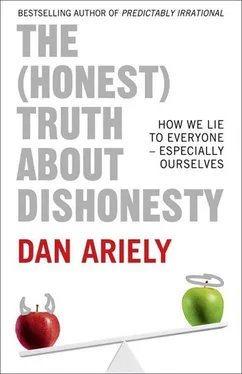Ariely, Dan - The (Honest) Truth About Dishonesty - How We Lie to Everyone – Especially Ourselves
Здесь есть возможность читать онлайн «Ariely, Dan - The (Honest) Truth About Dishonesty - How We Lie to Everyone – Especially Ourselves» весь текст электронной книги совершенно бесплатно (целиком полную версию без сокращений). В некоторых случаях можно слушать аудио, скачать через торрент в формате fb2 и присутствует краткое содержание. Жанр: Старинная литература, на английском языке. Описание произведения, (предисловие) а так же отзывы посетителей доступны на портале библиотеки ЛибКат.
- Название:The (Honest) Truth About Dishonesty: How We Lie to Everyone – Especially Ourselves
- Автор:
- Жанр:
- Год:неизвестен
- ISBN:нет данных
- Рейтинг книги:4 / 5. Голосов: 1
-
Избранное:Добавить в избранное
- Отзывы:
-
Ваша оценка:
- 80
- 1
- 2
- 3
- 4
- 5
The (Honest) Truth About Dishonesty: How We Lie to Everyone – Especially Ourselves: краткое содержание, описание и аннотация
Предлагаем к чтению аннотацию, описание, краткое содержание или предисловие (зависит от того, что написал сам автор книги «The (Honest) Truth About Dishonesty: How We Lie to Everyone – Especially Ourselves»). Если вы не нашли необходимую информацию о книге — напишите в комментариях, мы постараемся отыскать её.
The (Honest) Truth About Dishonesty: How We Lie to Everyone – Especially Ourselves — читать онлайн бесплатно полную книгу (весь текст) целиком
Ниже представлен текст книги, разбитый по страницам. Система сохранения места последней прочитанной страницы, позволяет с удобством читать онлайн бесплатно книгу «The (Honest) Truth About Dishonesty: How We Lie to Everyone – Especially Ourselves», без необходимости каждый раз заново искать на чём Вы остановились. Поставьте закладку, и сможете в любой момент перейти на страницу, на которой закончили чтение.
Интервал:
Закладка:
What decisions did participants make while laboring under more and less cognitive strain? Did the “Yum, cake!” impulse win the day, or did they select the healthy fruit salad (the well-reasoned choice)? As Baba and Sasha suspected, the answer depended in part on whether the participants were thinking about an easy-to-remember number or a hard one. Those breezing down the hall with a mere “35” on their minds chose the fruit much more frequently than those struggling with “7581280.” With their higher-level faculties preoccupied, the seven-digit group was less able to overturn their instinctive desires, and many of them ended up succumbing to the instantly gratifying chocolate cake.
The Tired Brain
Baba and Sasha’s experiment showed that when our deliberative reasoning ability is occupied, the impulsive system gains more control over our behavior. But the interplay between our ability to reason and our desires gets even more complicated when we think about what Roy Baumeister (a professor at Florida State University) coined “ego depletion.”
To understand ego depletion, imagine that you’re trying to lose a few extra pounds. One day at work, you are eyeing a cheese danish at the morning meeting, but you’re trying to be good, so you work very hard to resist the temptation and just sip your coffee instead. Later that day, you are craving fettuccine alfredo for lunch but you force yourself to order a garden salad with grilled chicken. An hour later, you want to knock off a little early since your boss is out, but you stop yourself and say, “No, I must finish this project.” In each of these instances your hedonic instincts prompt you toward pleasurable types of gratification, while your laudable self-control (or willpower) applies opposing force in an attempt to counteract these urges.
The basic idea behind ego depletion is that resisting temptation takes considerable effort and energy. Think of your willpower as a muscle. When we see fried chicken or a chocolate milkshake, our first reaction is an instinctive “Yum, want!” Then, as we try to overcome the desire, we expend a bit of energy. Each of the decisions we make to avoid temptation takes some degree of effort (like lifting a weight once), and we exhaust our willpower by using it over and over (like lifting a weight over and over). This means that after a long day of saying “no” to various and sundry temptations, our capacity for resisting them diminishes—until at some point we surrender and end up with a belly full of cheese danish, Oreos, french fries, or whatever it is that makes us salivate. This, of course, is a worrisome thought. After all, our days are increasingly full of decisions, along with a never-ending barrage of temptations. If our repeated attempts to control ourselves deplete our ability to do so, is it any wonder that we so often fail? Ego depletion also helps explain why our evenings are particularly filled with failed attempts at self-control—after a long day of working hard to be good, we get tired of it all. And as night falls, we are particularly likely to succumb to our desires (think of late-night snacking as the culmination of a day’s worth of resisting temptation).
WHEN JUDGES GET TIRED
In case you’ve got a parole hearing coming up, make sure it’s first thing in the morning or right after lunchtime. Why? According to a study by Shai Danziger (a professor at Tel Aviv University), Jonathan Levav (a professor at Stanford University), and Liora Avnaim-Pesso (a professor at Ben-Gurion University of the Negev), judges on parole boards tend to grant parole more frequently when they are most refreshed. Investigating a large set of parole rulings in Israel, the researchers found that parole boards were more likely to grant parole during their first cases of the day and just after their lunch breaks. Why? The default decision of parole boards is not to grant parole. But it seems that when the judges felt rejuvenated, which was first thing in the morning or after just having eaten and taken a break, they had an increased ability to override their standard decision, make a more effortful decision, and grant parole more frequently. But over the many difficult decisions of the day, as their cognitive burden was building up, they opted for the simpler, default decision of not granting parole.
I think that PhD students (a slightly different sort of prisoner) instinctively understand this mechanism, which is why they often bring doughnuts, muffins, and cookies to their dissertation proposals and defenses. Based on the results of the parole study, it is likely that their judges are more likely to grant them academic parole and let them start their own independent lives.
Testing the Moral Muscle
In the TV series Sex and the City , Samantha Jones (the blondest and most salacious one, for those not in the know) finds herself in a committed relationship. She begins eating compulsively and consequently gains weight. What’s interesting is the reason behind this baffling behavior. Samantha notices that her eating compulsion started when a good-looking man moved in next door—just the kind of man she would have gone after when she was single. She realizes that she’s using food as a bulwark against temptation: “I eat so I don’t cheat,” she explains to her friends. Fictional Samantha is depleted, just like a real person. She can’t resist all temptation, so she compromises by falling for food instead of promiscuity.
Sex and the City is no cinematic or psychological masterpiece, but it poses an interesting question: Might people who overtax themselves in one domain end up being less moral in others? Does depletion lead us to cheat? That is what Nicole Mead (a professor at Católica-Lisbon), Roy Baumeister, Francesca Gino, Maurice Schweitzer (a professor at the University of Pennsylvania), and I decided to check out. What would happen to real-life Samanthas who were depleted by one task and then given an opportunity to cheat on another? Would they cheat more? Less? Would they predict that they are more likely to succumb to temptation and therefore try to avoid the tempting situation altogether?
Our first experiment included several steps. First, we split our participants into two groups. We asked one group to write a short essay about what they had done the previous day without using the letters “x” and “z.” To get a feeling for this task, try it yourself: In the space below, write a short synopsis of one of your favorite books, but don’t use the letters “x” and “z.” Note: you cannot simply omit the letters from the words—you must use words that do not contain an “x” or “z” (e.g., “bicycle”).

We called this the nondepleting condition because, as you can tell, it’s pretty easy to write an essay without using the letters “x” and “z.”
We asked the other group to do the same thing but told them not to use the letters “a” and “n.” To get a better grasp of how this version of the task is different, try writing a short synopsis of one of your favorite movies while not using any words that contain the letters “a” and “n.”

As you probably discovered from your experience with the second task, trying to tell a story without using “a” and “n” required our storytellers to constantly repress the words that naturally popped into their minds. You can’t write that the characters “went for a walk in the park” or “ran into each other at a restaurant.”
Читать дальшеИнтервал:
Закладка:
Похожие книги на «The (Honest) Truth About Dishonesty: How We Lie to Everyone – Especially Ourselves»
Представляем Вашему вниманию похожие книги на «The (Honest) Truth About Dishonesty: How We Lie to Everyone – Especially Ourselves» списком для выбора. Мы отобрали схожую по названию и смыслу литературу в надежде предоставить читателям больше вариантов отыскать новые, интересные, ещё непрочитанные произведения.
Обсуждение, отзывы о книге «The (Honest) Truth About Dishonesty: How We Lie to Everyone – Especially Ourselves» и просто собственные мнения читателей. Оставьте ваши комментарии, напишите, что Вы думаете о произведении, его смысле или главных героях. Укажите что конкретно понравилось, а что нет, и почему Вы так считаете.












